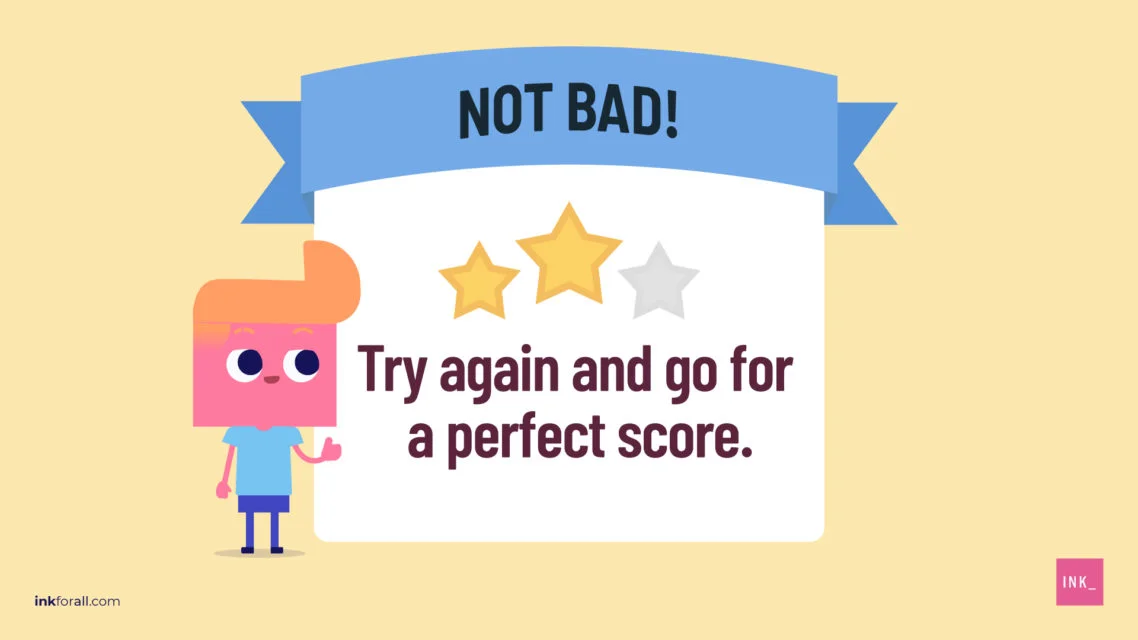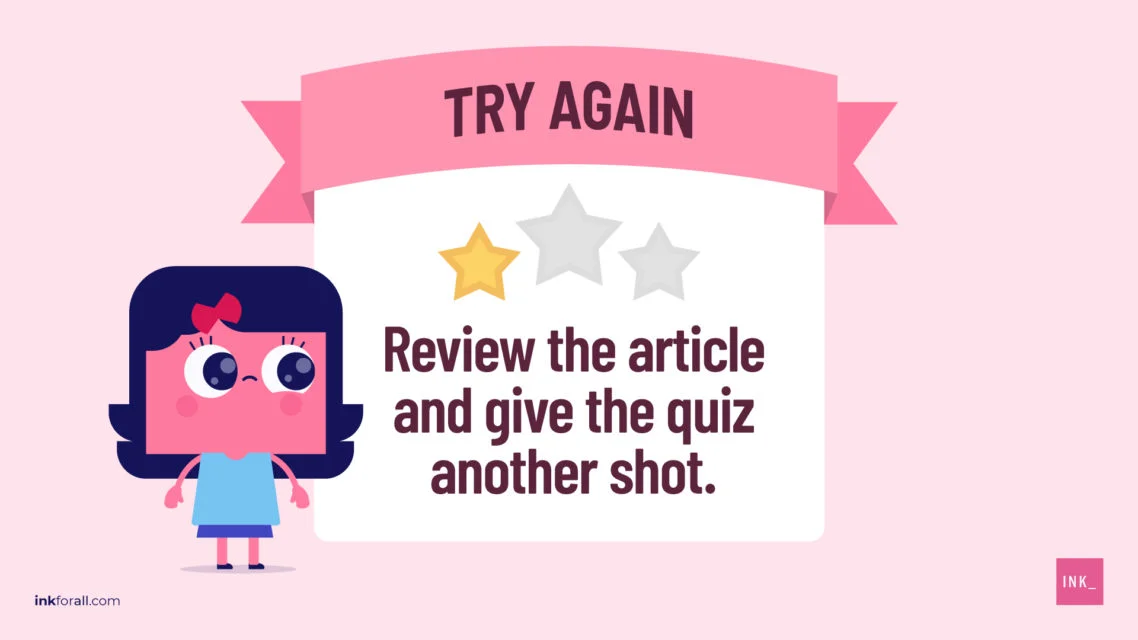Main Get Got Gotten Takeaways:
- Get, got and gotten are all correct but they are not interchangeable.
- Get is the present tense of this verb (infinitive: to get).
- Got is the past tense of this verb. It’s also the first of two correct options for the get past participle.
- Gotten is a word. In fact, its the second of the two past participles of get.
- In American English, the word gotten is no more or less formal than the word getor got. Instead, it really comes down to your personal style and desired tone.
Get, got, gotten — which is it? Have you gotten better at grammar, or have you got better at grammar — or are both got and gotten acceptable? Let’s look at the difference between these three words as well as example sentences for each.
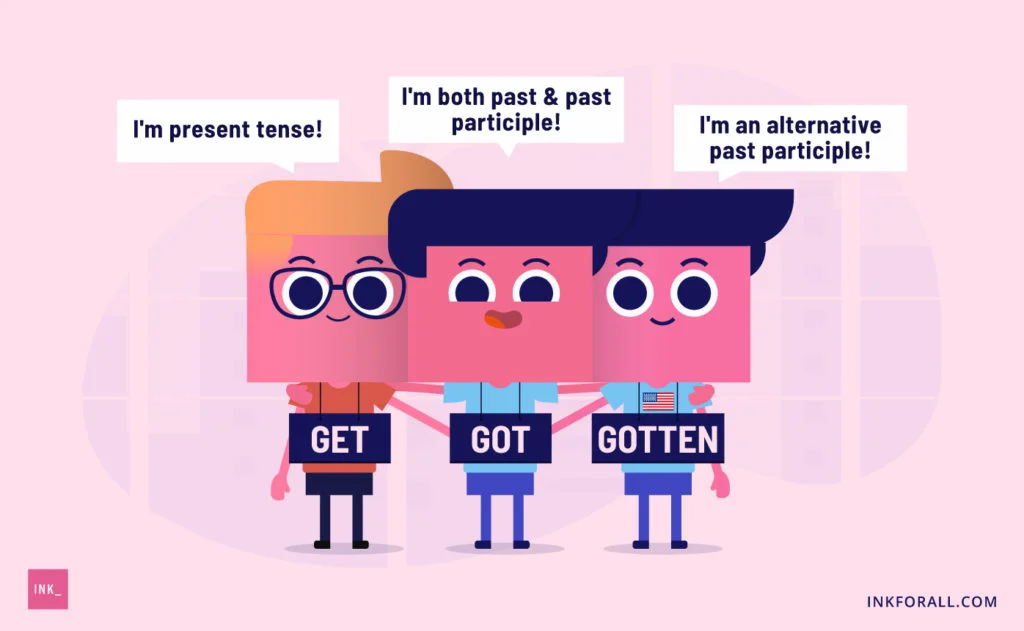

Is it Correct to say Gotten?
Yes, it is correct to say gotten. In fact, gotten and got are both get past participles, but they mean slightly different things. For example, gotten means “I acquired,” whereas got means “I have.” Moreover, got is also the past tense of the verb to get. Another difference between these words is regional preference. North American English speakers tend to use gotten while British English speakers prefer the word got instead.
Which is Correct: Got or Gotten?
Both got and gotten are past participles of the word “get.” Meaning, they are both correct when used in that form. However, “gotten“ is more common in American English, while “got“ is popularly used in British and Australian English.
It’s a different story though if we’re talking about the simple past tense of the verb get. For this, regardless of the context, it will always be “got.
What is Another Word for Gotten?
Another word for gotten is acquired. What’s more, synonyms for any form of get (including the past participle gotten) include acquire, obtain, receive, purchase, buy, earn, come in to, gain, collect, and come by. In fact, you can use any of those similar words in place of get, got or gotten in a sentence.
Get, Got, and Gotten Example Sentences
Here are examples of how to use get in a sentence:
Here are examples of how to use got in a sentence:
Here are examples of how to use gotten in a sentence:
[Correct]The Joint Chiefs of Staff felt they had gotten clear orders from the President.[/correct]
Get: present tense of the verb to get
Got:
- Past tense of the verb to get
- 1/2 correct options of the past participle of the verb to get (preferred in UK English)
Gotten: 2/2 correct options of the past participle of the verb to get (preferred in US English)
Has Got or Gotten?
Has got and has gotten are interchangeable. But people in the United States use the word gotten more often than the word got. Both gotten and got are past-tense versions of get. “I got“ means “I have,” whereas “I have gotten“ means “I acquired.“British English speakers are more likely to use the phrase “has got“ to indicate “have in my/their possession.” Let’s see a few examples in action:
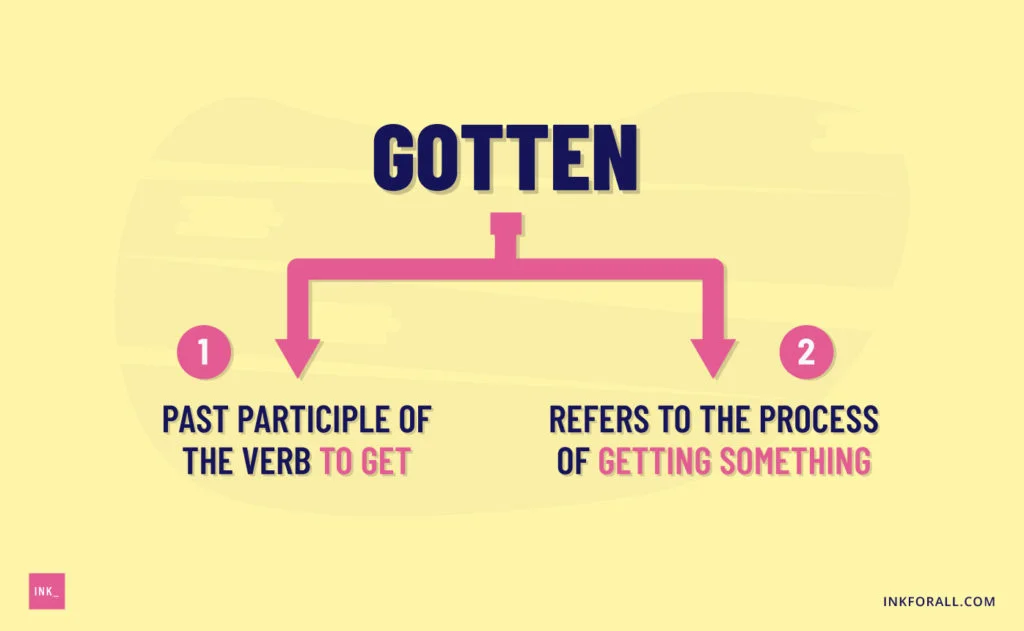

“Could Have Gotten” Meaning?
The phrase “could have gotten” means that there was an opportunity to get something in the past, but it slipped away or wasn’t taken advantage of (e.g.,I could have gotten a perfect grade on the test if I had just studied a bit more). The phrases “could have,” “should have,” and “would have” are the three past tense modals. As such, they show what might have happened but did not actually occur. Therefore, “could get” and “could have gotten” function similarly to “get” and “have gotten.”
Subject + could/should/would + have + Past Participle Verb
Is Gotten Formal?
In American English, the word gotten is no more or less formal than any other form of get. Originally a Middle English word, gotten is still used in both academic and informal writing in Canada and in the US. In the UK, Australia and New Zealand, writers use the word got rather than gotten in both formal and informal writing.
It’s important to note that got has a common colloquial use that isn’t grammatically correct. For instance, you may hear someone use the word got as a synonym for has. While you might say this in a casual conversation, you should avoid it (and never write it) in more formal or professional settings.
Is Gotten an Americanism?
Many assume that gotten is an Americanism because Americans use the word more than other English-speaking people. That isn’t true. In fact, both gotten and got date back to as early as 4th century Middle English. Therefore, gotten has been around just as long as got — and some people even consider it an antiquated form of got.


Get Got Gotten in Review
On one hand, get is present tense, whilegot and gotten are both past participles of get. Surprisingly, gotten isn’t an Americanism — it’s actually just as old as the word got.
Have you got (or gotten!) the get/got/gotten difference down?
Get, Got, Gotten? Do you Know Which one to use? Take the Quiz Below!
Get, Got, Gotten Question #1
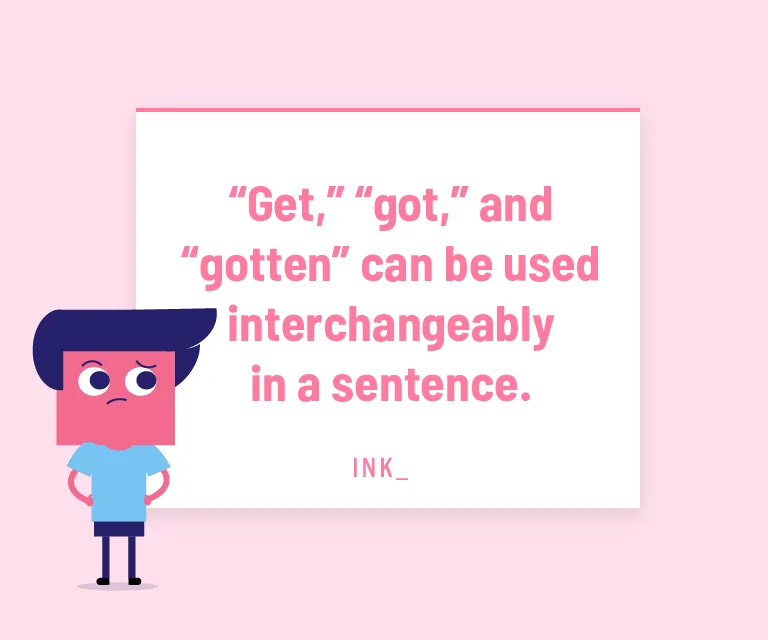

The answer is FALSE. “Gotten” and “got” are both past participles of “get.” However, they mean slightly different things.
Get or Gotten Question #2
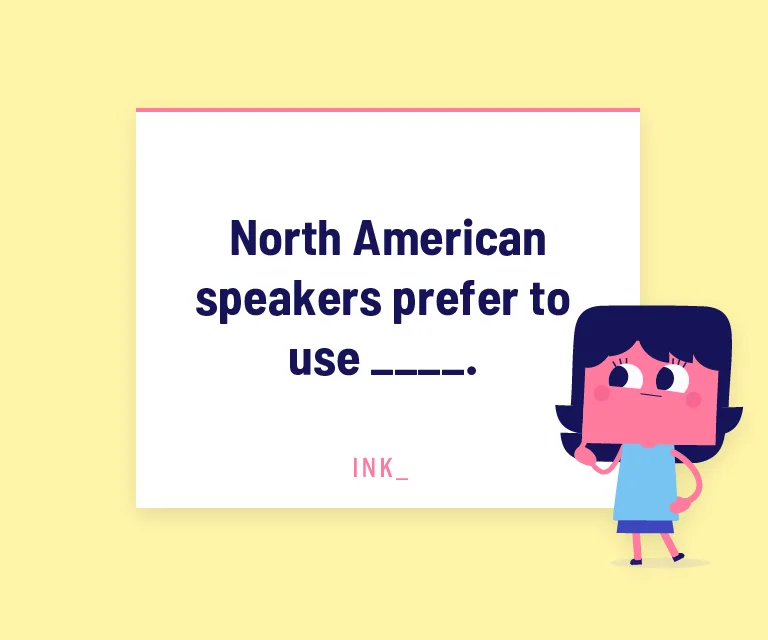

The answer is B. North American English speakers tend to use gotten while British English speakers prefer got.
Got vs. Gotten Question #3
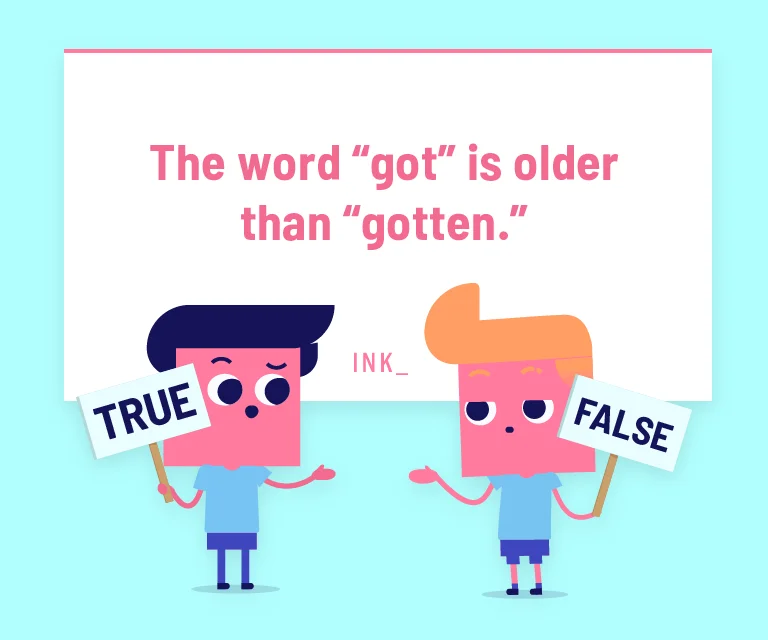

The answer is FALSE. Both words originate in Middle English.
Get, Got, Gotten Question #4


The answer is B. In this sentence, “got” serves as the past tense of the verb “to get.”
Get, Got, Gotten Question #5
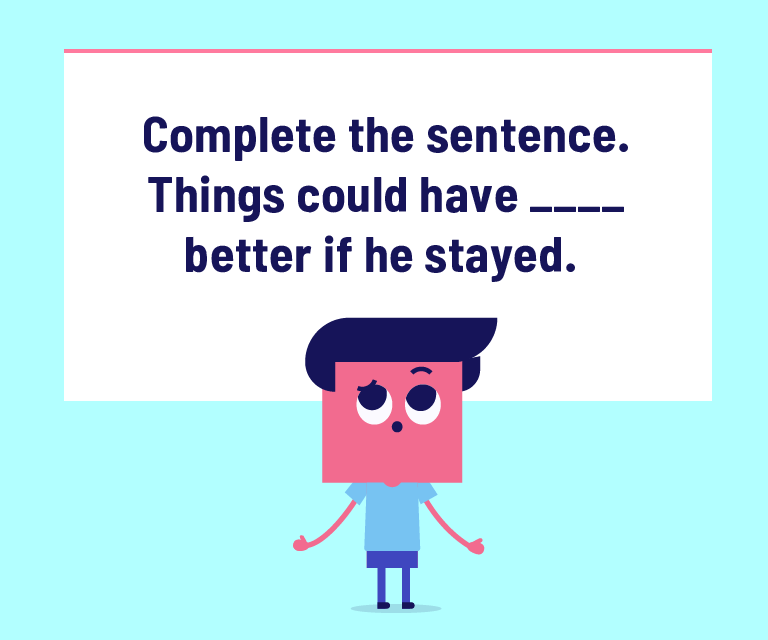

The answer is C. The phrase “could have gotten” suggests that an opportunity to get something in the past slipped away.
Got Question #6
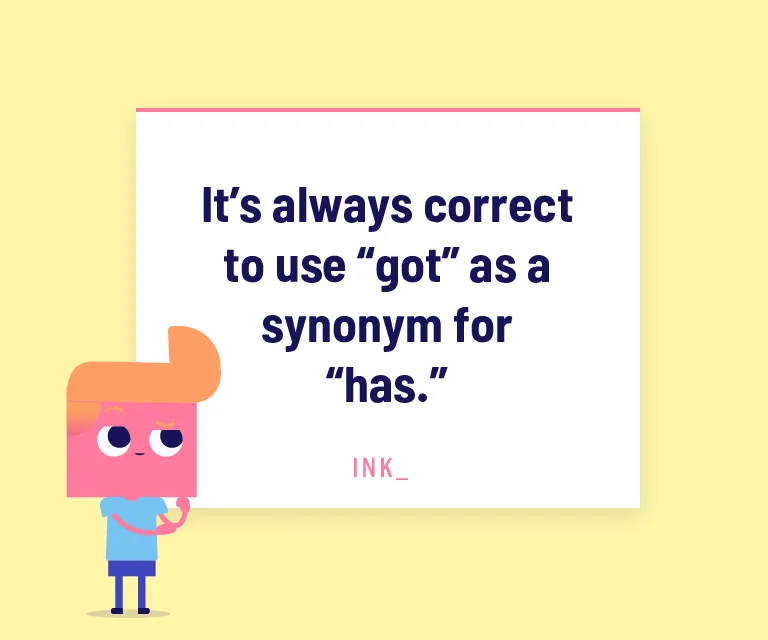

The answer is FALSE. Avoid using “got” as a synonym for “has” in formal or professional settings.


